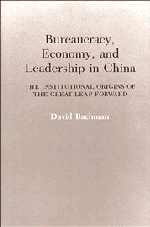Book contents
- Frontmatter
- Contents
- Preface
- Acknowledgments
- Chronology
- 1 Introduction
- Part I Historical background and conceptual approach
- Part II The institutional origins of the Great Leap Forward
- 4 The financial coalition
- 5 The planning and heavy industry coalition
- 6 The Party as agent of social transformation
- 7 The views of the top leadership
- 8 The Third Plenum of the Eighth Central Committee and the Great Leap Forward
- 9 Conclusions
- Appendix: The constraints on Mao
- Bibliography
- Index
9 - Conclusions
Published online by Cambridge University Press: 21 March 2010
- Frontmatter
- Contents
- Preface
- Acknowledgments
- Chronology
- 1 Introduction
- Part I Historical background and conceptual approach
- Part II The institutional origins of the Great Leap Forward
- 4 The financial coalition
- 5 The planning and heavy industry coalition
- 6 The Party as agent of social transformation
- 7 The views of the top leadership
- 8 The Third Plenum of the Eighth Central Committee and the Great Leap Forward
- 9 Conclusions
- Appendix: The constraints on Mao
- Bibliography
- Index
Summary
This book has examined the origins of China's Great Leap Forward from the vantage point of the interplay of three different coalitions of political actors. Each coalition presented a program of economic and social change to cope with the problems facing China's political economy in 1956–1957 and the specific difficulties confronting important bureaucracies in carrying out their organizational missions. The top leaders had some autonomy in deciding on policies, but their freedom of choice was circumscribed by the proposals put forward by the coalitions within the state. Thus, Mao Zedong did not think up the Great Leap Forward on his own. Rather, he and the Chinese Communist Party coopted the program associated with the planning and heavy industry coalition and coupled it with demands for mass mobilization in the countryside and a greatly accelerated growth rate.
This chapter expands on the broader historical and analytical findings and issues of this study and covers the larger implications of the patterns of China's political economy as revealed in the origins of the Great Leap Forward. The main sections deal with the choices available to China's leadership in 1956–1957, the nature of China's coalitional politics, larger patterns of China's politics, and the sources of policy evolution and change in China. A brief afterword compares political and economic developments in 1957 with those in 1989.
The choices available to the leadership in 1956–1957
The year from September 1956 to September 1957 represents a lost reform in the history of the People's Republic of China.
- Type
- Chapter
- Information
- Bureaucracy, Economy, and Leadership in ChinaThe Institutional Origins of the Great Leap Forward, pp. 214 - 236Publisher: Cambridge University PressPrint publication year: 1991



